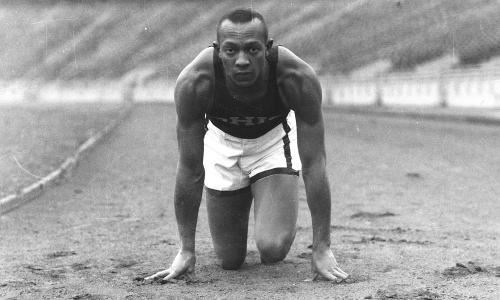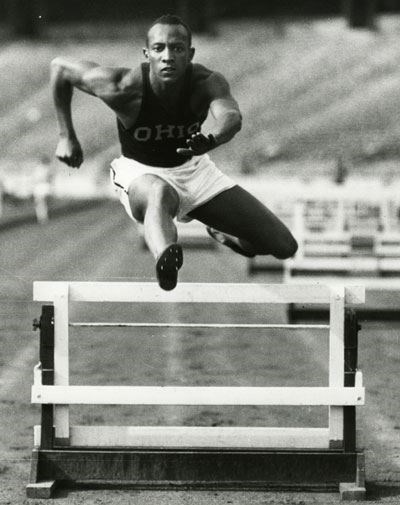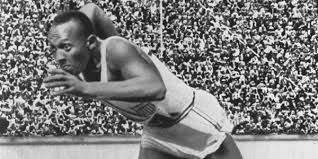Jesse Owens
by Jared from San Diego

|
| (www.ohiostatebuckeyes.com ()) |
A feeble child watches as the rest of his family works in the cotton fields. He is the grandson of a slave, and his family is often unable to afford to feed him because they are poor. This child- Jesse Owens- is now remembered as a track and field legend. James Cleveland "J.C." Owens was born on September 12, 1913 in Danville, Alabama (Smith). He was later given the nickname "Jesse" after a teacher mispronounced "J.C.". Owens won a total of four gold medals in the 1936 Berlin Olympics, and he broke both Olympic and World records ("Jesse Owens"). In 1976 Owens was awarded the Presidential Medal of Freedom by President Gerald Ford ("Jesse Owens"). A hero exhibits the character traits of work ethic, courage, and perseverance. Heroes must strive to do their best even in the most unimportant of situations, and a true hero will have the courage to stand up for what is right. A hero perseveres through any obstacle, regardless of how challenging it may be. Jesse Owens was the fastest Olympic runner of his time; however, his charitable deeds towards the poor, his courageous efforts in his competition, and his ability to persevere through racial barriers are what make him a hero. One of Jesse Owens's heroic traits was his compassion in his charitable deeds to the poor. In contempt of being on the verge of poverty himself, Owens, "[...]worked with youths, sharing of himself and the little material wealth that he had" ("Jesse Owens Olympic Legend"). Jesse Owens knew what poverty felt like because he was constantly facing financial issues. Owens was able to empathize with them, and he enjoyed giving to those less fortunate than himself. Most of all, Owens enjoyed helping others, especially young children. The one thing that made him happiest was helping those in need around him, and not gold medals or track and field. After he became famous at the Olympics, instead of boasting or training for the next Olympics, "[...]Owens found a job as a playground director working with underprivileged kids. The work would remain a passion" (Smith). Spending time around kids made Owens happy. He took pleasure in improving the lives of children because he wanted to be more than just an athlete- he wanted to positively influence the world. There were many other thing Owens could've done besides working as a playground director, but he made the choice to help his community. Jesse Owens was a hero not because of his status as an Olympic athlete, but because he inspired people with his actions to help the poverty stricken, despite being poor himself. 
|
| (library.osu.edu ()) |
One of Jesse Owens's heroic traits was his compassion in his charitable deeds to the poor. In contempt of being on the verge of poverty himself, Owens, "[...]worked with youths, sharing of himself and the little material wealth that he had" ("Jesse Owens Olympic Legend"). Jesse Owens knew what poverty felt like because he was constantly facing financial issues. Owens was able to empathize with them, and he enjoyed giving to those less fortunate than himself. Most of all, Owens enjoyed helping others, especially young children. The one thing that made him happiest was helping those in need around him, and not gold medals or track and field. After he became famous at the Olympics, instead of boasting or training for the next Olympics, "[...]Owens found a job as a playground director working with underprivileged kids. The work would remain a passion" (Smith). Spending time around kids made Owens happy. He took pleasure in improving the lives of children because he wanted to be more than just an athlete- he wanted to positively influence the world. There were many other thing Owens could've done besides working as a playground director, but he made the choice to help his community. Jesse Owens was a hero not because of his status as an Olympic athlete, but because he inspired people with his actions to help the poverty stricken, despite being poor himself. Jesse Owens was characterized as a hero because he made courageous efforts in his competition. During the time Owens was competing in the Olympics, "Germany's chancellor, Adolf Hitler, called the black athletes subhuman and said they could easily be defeated by the unquestionably superior German athletes" ("Jesse Owens", UXL Biographies, 2003). The hatred of non- Aryans was spreading throughout Germany, but Jesse Owens still had the audacity to compete against Hitler's so-called superior race. Not many people would challenge the beliefs of the chancellor of a nation and the murderer of millions, but Jesse Owens openly stood up against him. Jesse Owens endured through racism to achieve his goal, and he turned the other cheek when people mocked and jeered at him. Jesse Owens's courage was a major step in ending the hatred at the time, and this is because, "During a time of deep-rooted segregation, he not only discredited Hitler's master race theory, but also affirmed that individual excellence, rather than race or national origin, distinguishes one man from another." ("Jesse Owens Olympic Legend"). Jesse Owens never once surrendered to Hitler and his twisted beliefs. Instead, he opposed and defeated Hitler's Aryans in track and field events, which enraged Hitler. It was difficult to stand up for what is right when few others did, but Jesse Owens had the courage to do it. He had his mind set on his goal, and nothing would stop him. Courage is an important trait in a hero, and Jesse Owens inspired others with his courage in his actions in the circumstances he faced when competing. 
|
| (www.cinemablend.com ()) |
Jesse Owens was a hero not because of his Olympic track and field feats, but rather because of his altruistic contributions to those in need, his fearless endeavors in his competition, and his endurance through racial bigotry. Owens was poor; however, he gave what little he had to help people who needed the money more than he. He courageously competed against people who despised non- Aryan. Owens's incredible tenacity helped him transform from a poor son of a cotton farmer into one of the greatest track and field athletes in the history of mankind, and all he did this during a time where many people were intolerant of other races. "'We all have dreams. In order to make dreams come into reality, it takes an awful lot of determination, dedication, self-discipline and effort'" (Jesse Owens). Through Jesse Owens's life we can learn valuable character traits like compassion, grit, and determination. Jesse Owens did what he wanted to do, and he didn't let hatred or racial barriers stand in his way. Owens's donations of time and money to the less fortunate inspires me to help those that I see are in need. In addition, he followed his passion of running in spite of some people's hatred of him, and this inspires me to follow my passions. His courage also inspires me to stand up for what is right, even if no one else will- especially if this means standing up for another person or group of people. Finally, His perseverance inspires me continue battling through the hard times, and he has taught me to never give up. Imagine a world where anyone would do anything to help one another. Everyone stands up for the right thing, and there is no such thing as a racial barrier. This type of world is possible if we all have the compassion, courage, and the ability to persevere through racial barriers like Jesse Owens. Works Cited
Baker, William J. "American National Biography Online: Owens, Jesse." American National Biography Online: Owens, Jesse. N.p., 2000. Web. 04 Feb. 2016.
http://www.anb.org/articles/19/19-00256.html?from=../19/19-00861.html&from_nm=Bell%2C%20Cool%20Papa
"Jesse Owens." DISCovering Multicultural America: African Americans, Hispanic Americans, Asian Americans, Native Americans. Detroit: Gale, 2003. Student Resources in Context. Web. 27 .Jan. 2016.
"Jesse Owens Olympic Legend." JesseOwens.com. Luminary Group LLC, 2009. Web. 04 Feb. 2016.
http://www.jesseowens.com/"
Jesse Owens." UXL Biographies. Detroit: UXL, 2003. Student Resources in Context. Web. 4 Feb. 2016.
Smith, Scott S. "Jesse Owens Sped Past Nazis In 1936 Olympics Electrify: His four gold medals crushed Hitler's delusions." Investor's Business Daily 30 Sept. 2014: A3. Student Resources in Context. Web. 29 Jan. 2016.
Page created on 2/18/2016 12:00:00 AM
Last edited 2/18/2016 12:00:00 AM
The beliefs, viewpoints and opinions expressed in this hero submission on the website are those of the author and do not necessarily reflect the beliefs, viewpoints and opinions of The MY HERO Project and its staff.




